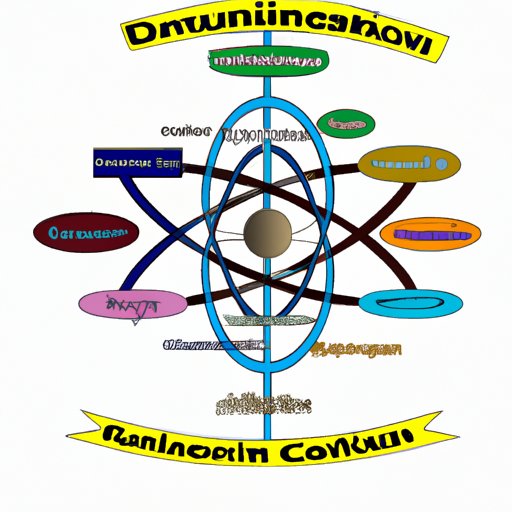Introduction
The relationship between science and religion has been an ongoing debate throughout history. On the one hand, science is the systematic study of the natural world, while religion is based on faith and a belief in a higher power. On the other hand, both disciplines attempt to explain the mysteries of the universe and search for truth. In order to better understand how science and religion can work together, it is important to examine the differences between scientific and religious theories about the origin of the universe, the role of faith in scientific discovery, and how science can be used to interpret religious texts.

A Comparison of Scientific and Religious Theories about the Origin of the Universe
The scientific and religious views of the origin of the universe are often seen as being in conflict with one another. According to science, the universe began with the Big Bang 13.8 billion years ago. This theory is supported by evidence such as the expansion of space, the cosmic microwave background, and the abundance of elements in the universe. In contrast, many religions view the origin of the universe to be the result of a divine act of creation. For example, in the Christian Bible, it states that “In the beginning God created the heavens and the earth” (Genesis 1:1).
Despite their contradictory nature, there is some common ground between these two views. For instance, physicist Stephen Hawking has argued that “the laws of science, as we know them at present, contain many fundamental numbers, like the size of the electric charge of the electron and the ratio of the masses of the proton and the electron… The remarkable fact is that the values of these numbers seem to have been very finely adjusted to make possible the development of life” (Hawking, 1988). This suggests that there may be an underlying intelligence or purpose behind the universe, which could be seen as compatible with the religious view of a divine creator.
An Exploration of the Role of Faith in Scientific Discovery
Although faith and science are often seen as being at odds with one another, there are numerous examples of scientists who were also deeply religious. One of the most famous is Albert Einstein, who famously wrote that “science without religion is lame, religion without science is blind” (Einstein, 1954). He believed that faith and science could coexist, and that each could inform and enrich the other.
In addition to inspiring scientific inquiry, faith can also influence the direction of research. For example, geneticist Francis Collins was inspired by his Christian beliefs to focus his research on discovering the genetic basis of human diseases. His work ultimately led to the mapping of the human genome, which has had a profound impact on medical science.

A Discussion of How Science Can Be Used to Interpret Religious Texts
Many religious texts contain stories and teachings that are open to interpretation. Some people believe that science can be used to help understand the deeper meaning of these texts. For example, theologian John Haught argues that evolutionary biology can help us to understand the concept of sin in the Christian Bible. He proposes that sin is not simply an act of disobedience, but rather a reflection of our evolutionary flaws and limitations (Haught, 2000).
Different approaches can be taken when using science to interpret religious texts. Some people believe that science should be used to explain the literal meaning of the text, while others suggest that it should be used to uncover the symbolic or metaphorical meaning. Each approach can lead to different interpretations, which can lead to further discussion and dialogue.
An Examination of the Ethical Implications of Using Science to Explain Religious Ideas
Using science to explain religious ideas can raise ethical concerns. One issue is the potential for authority and legitimacy to be undermined. If science is used to explain religious concepts, then people may question the validity of those concepts and the authority of religious leaders.
Another concern is the potential for misinterpretation. If scientific ideas are used to explain religious texts, then it is important to ensure that the explanations are accurate and respectful. If not, then there is a risk of misrepresenting the original meaning of the text, which could lead to confusion and misunderstanding.

A Look at the Potential for a Cooperative Relationship between Science and Religion
Despite their differences, science and religion can work together in ways that benefit both disciplines. For instance, scientists and religious leaders can collaborate on issues such as environmental protection, poverty alleviation, and social justice. In addition, scientists can use religious texts as a source of inspiration for their research, while religious leaders can use scientific discoveries to help explain their beliefs.
However, there are challenges to finding common ground between the two disciplines. For example, some religious groups are resistant to scientific theories that contradict their beliefs, while some scientists are skeptical of religious claims. Furthermore, the language and concepts used in each discipline can be difficult to reconcile.
Conclusion
Science and religion can often appear to be at odds with one another. However, this does not mean that the two disciplines cannot work together. By examining the differences between scientific and religious theories about the origin of the universe, the role of faith in scientific discovery, and how science can be used to interpret religious texts, it is possible to find areas of common ground and potential for collaboration. It is important to recognize the ethical implications of using science to explain religious ideas, but with careful consideration and respect for both sides, a cooperative relationship between science and religion can be beneficial for both disciplines.
(Note: Is this article not meeting your expectations? Do you have knowledge or insights to share? Unlock new opportunities and expand your reach by joining our authors team. Click Registration to join us and share your expertise with our readers.)
